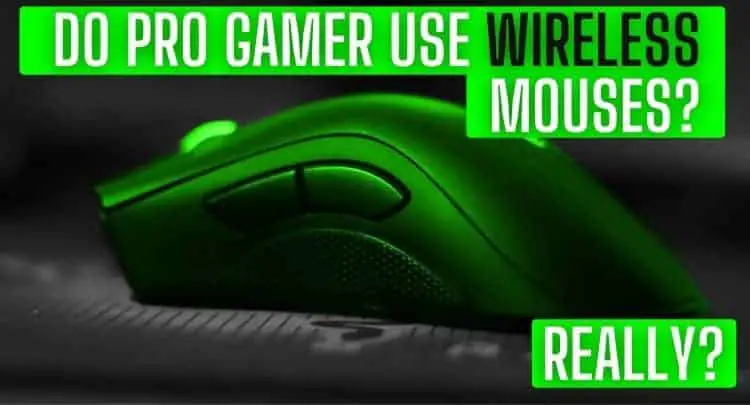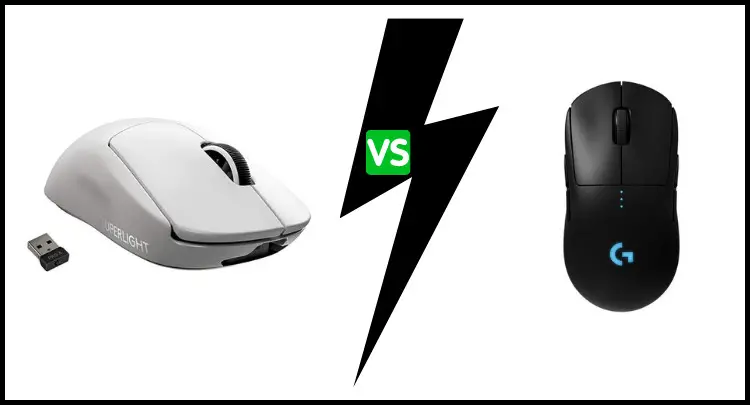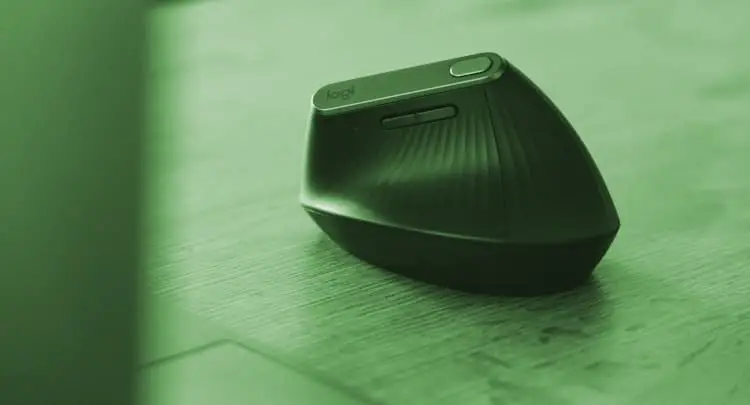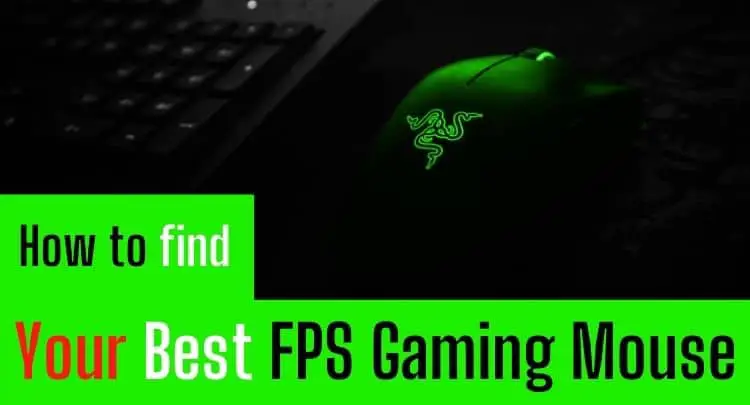In this post, we clarify whether professional gamers use wireless mice. Wireless mouse devices have been taboo for gamers for years. Battery too heavy, latency too high, and for the price, you could get a regular mouse in a double pack. Times are changing.
More and more gamers are switching to wireless mouse devices. Current battery technologies ensure that they are just as lightweight as cable mouse devices. The latency here is also between 14 ms – 16 ms. In Esport, where every millisecond counts, pro gamers are increasingly using wireless mouse devices.
Note: This article was written in English. Translations into other languages may not provide the same linguistic quality. We apologize for grammatical and semantic errors.
Advantages and Disadvantages of Wireless Mice
Wireless mouse devices are becoming more and more popular among gamers.
Not only among casual gamers but also highly specialized pro gamers.
Almost every top team like Vitality, BIG, Team Liquid, or the FaZe Clan has one or more players playing with a wireless mouse device.
In some cases, personal sponsorships such as Logitech plays a role. One might suspect that some players are “forced” to play with wireless mouse devices – similar to how athletes have to stick to their equipment contracts.
However, in the end, neither the sponsor, team, or player has any interest in the player’s performance reduced because of a mouse.
So I would vehemently contradict this statement.
Instead, it is the other way around that more and more players voluntarily switch based on their excellent experiences.
Wireless mouse devices have several advantages:
- Lower center of gravity due to the weight of the battery. Wired mouse devices usually try to compensate the center of gravity with additional weights.
- No more cable tangle – okay, that was obvious. Especially if you have to switch your mouse between two places more often (travel, LAN party…), then you know untangling cables is no fun.
- No influence on micro-movements. Especially players of first-person shooters know it: The crosshair suddenly jerks past the target because the cable got stuck somewhere or an object unintentionally blocks the cable. Furthermore, the cable’s weight influences the aiming in some movements if no cable holder (<- stylish, right?) is used.
However, until recently, wireless mouse devices naturally had some drawbacks.
- The batteries were too heavy and made even a smaller mouse feel like a concrete block.
- The batteries were also too weak. Hanging the mouse on a charging cable every day – the emphasis is on cables – was impractical.
- The price was enormously high. The reason was also here the battery. New technologies on the market are always expensive at first.
- The transmission technology was in its infancy. Comparison diagrams of cable mouse and wireless mouse devices showed that, very often, transmission packets were lost on the way from the mouse to the receiver on the PC.
- An awful latency in data transmission and transmission of key clicks.
While battery technologies have developed further and further, as with other devices (electric bicycles, smartphones, etc.) i.e., the runtime without recharging and the weight as weaknesses have been eliminated. But one rumor persists that wireless mouse devices still generate too much latency.
Let’s take a closer look at this…
Honest recommendation: You have the skill, but your mouse doesn't support your aiming perfectly? Never struggle with your mouse grip again. Masakari and most pros rely on the Logitech G Pro X Superlight. See for yourself with this honest review written by Masakari or check out the technical details on Amazon right now. A gaming mouse that fits you makes a significant difference!
Wireless Mouse Devices and the Latency Myth
In 2016, tests (source) had clearly shown that wireless mouse devices are not only on par with cable mouses when it comes to clicking latency and transmission latency, but that there were even the first devices to outperform cable mice.
We are talking about differences that are in the single-digit millisecond range.
In 2019, tests between high-quality cable and wireless mouse devices showed virtually identical overall latency. The best latency for both technologies was between 14ms – 16ms.
Source:
Latency is, therefore, no longer a decision criterion.
If you are still worried about consistent data transmission, you should take these values and use a wireless mouse. Suppose the mouse is used at a distance of fewer than 3 ft from the receiver on the PC.
In that case, the signal is nowadays just as stable as with data transmission via cable.
With more distance between transmitter and receiver, interferences must, of course, occur at some point, but who sits 10 ft away from the monitor?
Do Gamers Really Need a Wireless Gaming Mouse?
Gaming mice are per se more expensive than office mice. This can be explained by the different technology, the special design, and usually also enclosed special equipment such as exchangeable grip surfaces or similar.
There is a difference between high-tech gaming mice and regular mice for everyday use, even with wireless mouse devices. But, of course, the price difference also applies to this because wireless gaming mice are very different from standard wireless mouse devices.
For example, let’s take two Logitech products and hold them against each other:
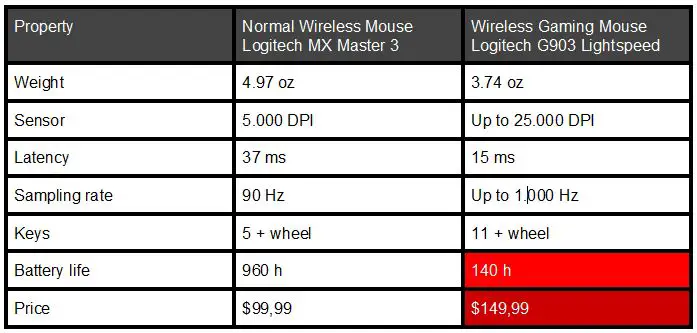
At a glance, it becomes clear that wireless mouse devices for gaming are…
- Lighter
- More precise
- Faster in processing optical information
- Customizable
- Energy needy
- More expensive
than regular wireless mice.
To play certain games reasonably well, gamers will probably have to dig a little deeper into their wallets because a gaming mouse is clearly a must.
How Relevant Is the Mouse as an Input Device for Gamers?
There are, of course, games that do not require a mouse. For example, you can control flight simulators or racing games better with a joystick, keyboard, and steering wheel than with a mouse.
However, strategy games, shooters, and smaller browser games require 99% precision and usually fast mouse clicks.
Especially with shooters, a gamer is dependent on 100% accuracy. A few pixels decide whether a hitbox is hit or not.
Especially in the pro gaming sector, where players find themselves in an unbelievable performance density and where millions of dollars are involved in the meantime, it is even more important that everything fits, from the brain to the muscles in the arm and hand to the fingertips and the movement or clicks.
The mouse is, therefore, largely responsible for the performance of a player. So it speaks even more for the use of wireless mouse devices that especially the very critical professionals, whose success depends on this input device, are increasingly switching to wireless devices.
Which Wireless Mouse Do Pro Gamers Use?
Of course, there are many good wireless gaming mice on the market, almost every well-known manufacturer has something on offer. However, at the moment, many pro gamers prefer the Logitech G Pro Wireless, or its successor, the Logitech G Pro X Superlight.
Pro gamers appreciate the shape, the long battery life, and the precise sensor technology of these mice.
Final Thoughts on Wireless Mice for Gaming
Wireless mouse devices are outpacing their wired counterparts. More freedom of movement, long battery runtimes, and equal latency make the wireless mouse a real alternative.
So it’s no surprise that more and more professional gamers are switching to wireless mice.
We can recommend playing with a good wireless mouse with a good conscience because Masakari has been playing without cables for years.
So wireless mice are a safe call. But what about vertical mice, also called ergonomic mice – can you use them for gaming?
For a deeper look into the topic, we recommend this post:
If you don’t even know which is the best gaming mouse for you, then check out this article:
If you have a question about the post or pro gaming in general, write to us: contact@raiseyourskillz.com.
If you want to get more exciting information about becoming a pro gamer and what relates to pro gaming, subscribe to our newsletter here.
GL & HF! Flashback out.

